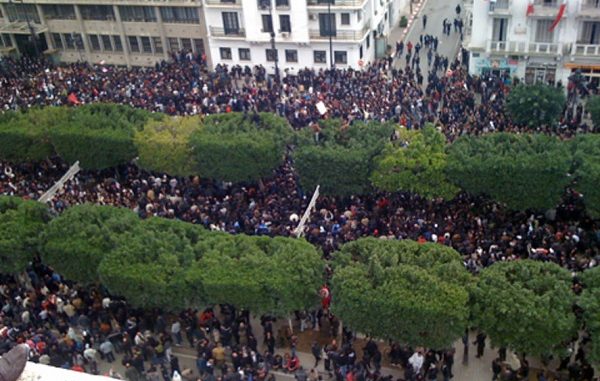
On Sunday 25th July, the president of Tunisia, Kaïs Saied, carried out a coup. This is in a country that has been labelled, “The Arab world’s only democracy”. He sacked the prime minister, Hichem Mechichi, along with the ministers of defence and justice. Parliament was closed down and surrounded by troops. They barred the way of its Speaker, Rached Gannouchi, who heads the Islamist party, Ennahda. With only 20% support, it is still the largest party in parliament. His party’s offices and local headquarters were stormed and set alight.
Gannouchi has denounced the president’s action as “a coup against the constitution and the revolution” but in the past ten years, there has been no resolution of the seething discontent amongst the vast layers of poor and unemployed in Tunisian society. As the ‘I’ newspaper put it, “The dramatic move…followed violent nationwide rallies demanding the resignation of the prime minister and dissolution of parliament, amid a disastrous coronavirus outbreak that has pushed the healthcare system to the point of collapse and escalated economic woes” (27 July).
Below is a commentary by Gauche Révolutionnaire reporters (CWI in France)
It has been ten years since the fall of Ben Ali. Although a decade has passed since then, the situation has not improved for Tunisians. Nine governments have succeeded one another, all of them falling in turn following mass protest movements. Whether it is liberals or Islamists in power, nothing has changed fundamentally. The situation is getting worse for the majority of the population and democracy is increasingly being flouted.
The health crisis has shown the weakness of the current government of President Kaïs Saïdes. It has been incapable of protecting the population: there are no more hospital beds, no more oxygen supplies, people are dying in front of the hospitals and there is widespread poverty.
The unemployment rate among young people is well over 40%. The minimum wage is around 450 dinar ($161), while an average rent costs 300-350 dinar. Food prices have increased by more than 7% over one year (June 2020-2021) with some things, such as vegetables, going up by 13%!
Faced with this situation, protests and strikes have started up again. On 25 July, a big mobilisation of youth and workers took place in all the provinces demanding for work for all and better conditions, the right to a decent life and for the resignation of the government.
This is what moved president Kaïs to suspend the parliament and dismiss the Prime Minister. There is no longer a parliament, the president governs alone.
The Islamists have denounced the ‘coup d’état’. The left-wing organisations have no clear position to date. The leadership of the major workers’ union, the UGTT, is supporting the president’s political decision and calls for remaining behind him to maintain stability. When it should be fighting for a government of workers and the majority of the population, the UGTT leadership is not letting a clear position emerge, rejecting both Islamist and liberal capitalists.
Mass discontent
It is understandable that against a background of mass discontent and paralysis of government, there can be the desire for a government that acts. But no support should be given to Kaïs Saied, nor to the dismissed Prime Minister Hichem Michichi, nor to Rached Ghannouchi, the ex-president of the parliament, as they all pursue similar pro-capitalist policies as their predecessors.
It is up to the trade union base to organise, to impose a different orientation on the union leadership (and to change it, if it does not listen to its base). Committees need to be created involving the workers, calling on the non-unionised, the unemployed, the youth to join them – in all the villages, the neighbourhoods, the provinces – in order to take power and run the country’s economy.
A new opportunity is presented today in Tunisia. It is up to the youth and the workers to seize it to build a workers’ movement that can fight all the rival elites and for an end to capitalist chaos and misery. Socialists argue for a programme to establish genuine democratic rights – free speech, no discrimination on the basis of religion or political views, freedom of assembly, freedom to organise parties and campaign on a socialist programme to take control of the economy so that it is publicly-owned, democratically controlled and planned to serve the needs of all.
A fighting programme:
- Work for all on decent wages!
- Resources and staff for the public services of health, education etc.!
- Nationalise of all major companies and multinational corporations!
- End the state of emergency!
- For a workers’ government that fights to fulfil the aspirations of the 2011 revolution – an equal, free and democratic society, not this present system of either liberal or Islamist capitalists!
- For a truly socialist Tunisia, that aims to spread the struggle to end capitalist rule and link up with the mass movements of Algeria, Morocco and Africa!
Special financial appeal to all readers of socialistworld.net |
Support building alternative socialist media Socialistworld.net provides a unique analysis and perspective of world events. Socialistworld.net also plays a crucial role in building the struggle for socialism across all continents. Capitalism has failed! Assist us to build the fight-back and prepare for the stormy period of class struggles ahead. Please make a donation to help us reach more readers and to widen our socialist campaigning work across the world. |
Donate via Paypal |
| M | T | W | T | F | S | S |
|---|---|---|---|---|---|---|
| 1 | 2 | 3 | 4 | |||
| 5 | 6 | 7 | 8 | 9 | 10 | 11 |
| 12 | 13 | 14 | 15 | 16 | 17 | 18 |
| 19 | 20 | 21 | 22 | 23 | 24 | 25 |
| 26 | 27 | 28 | 29 | 30 | 31 | |

